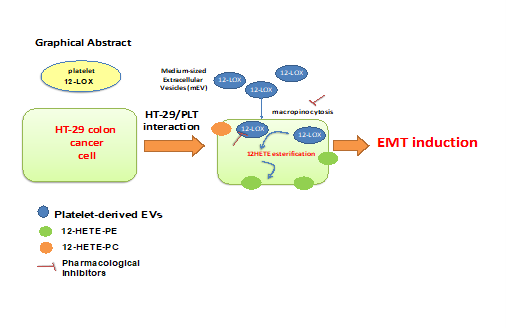Platelets can promote epithelial-mesenchymal transition (EMT) in cancer cells

A new mechanism described in the Paola Patrignani’s work recently accepted for publication in the Journal of Lipid Research (IF 5,922), a leading journal on the science of lipids in health and disease.
“Platelets induce free and phospholipid-esterified 12-HETE generation in colon cancer cells by delivering 12-lipoxygenase”. The first authors are Annalisa Contursi, Simone Schiavone and Melania Dovizio. However, it is greatly appreciated the contribution of other national and international coauthors. In particular, Valerie B. O’Donnell and her collaborators from Cardiff University (UK) and Angel Lanas from the University of Zaragoza. Also, the collaboration with other CAST researchers is acknowledged, such as Stefania Tacconelli, Rosa Fullone, Paola Lanuti, Marco Marchisio, Mirco Zucchelli, and Patrizia Ballerini.
Researchers have found a new mechanism by which platelets can promote cancer metastasis. The data are fascinating: platelets can promote epithelial-mesenchymal transition (EMT) in cancer cells, a phenomenon known to confer high-grade malignancy via the transfer of platelet-type 12-lipoxygenase contained in platelet-derived medium size extracellular vesicles (mEVs). These cancer cells now generate 12-hydroxyeicosatetraenoic acid (12-HETE), considered a key modulator of cancer metastasis. However, we showed that 12-HETE is mainly esterified in plasmalogen phospholipids. Modifying cancer cell phospholipids by 12-HETE may functionally impact cancer cell biology and represent a novel target for anticancer agent development. Selective inhibitors of 12-LOX, which are in clinical development, such as ML-355, or macropinocytosis inhibitors, which prevent the internalization of mEVs, may be potential anticancer tools.